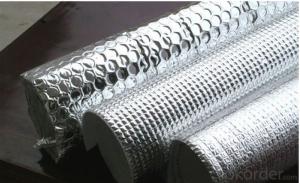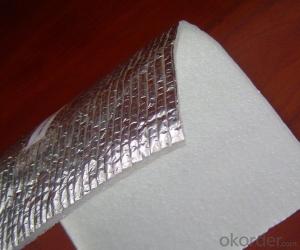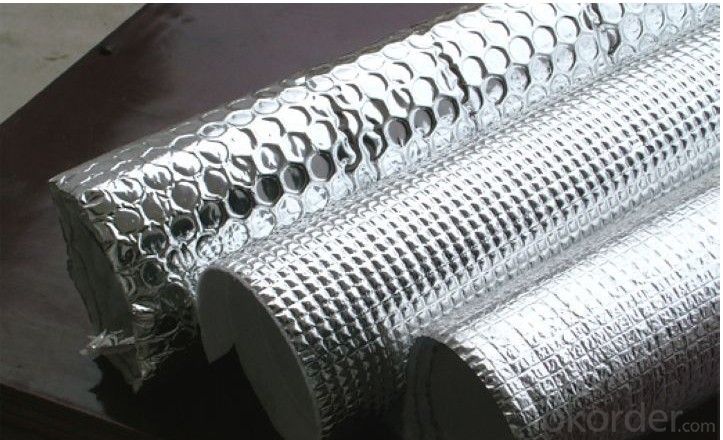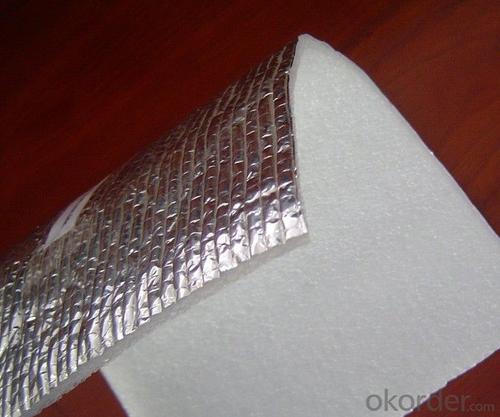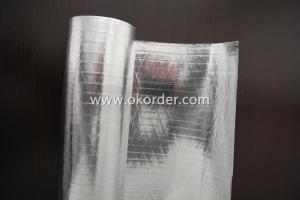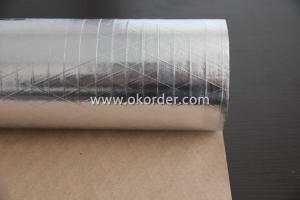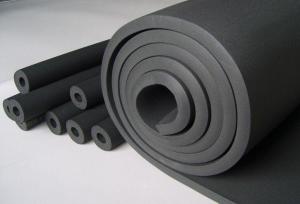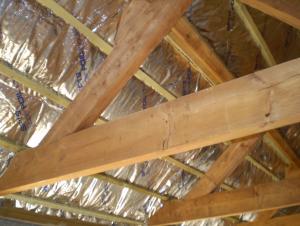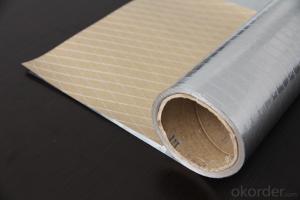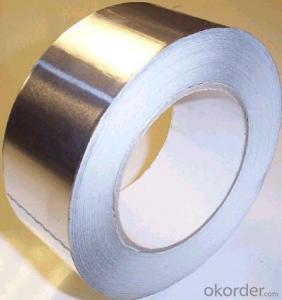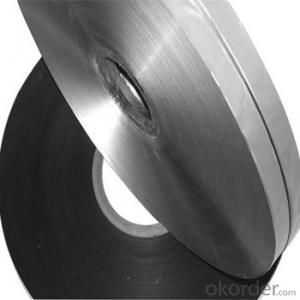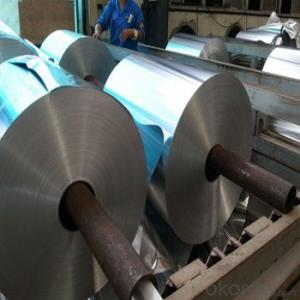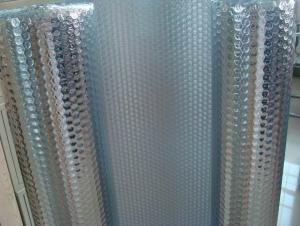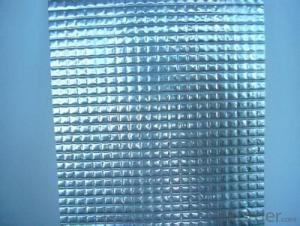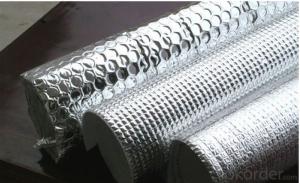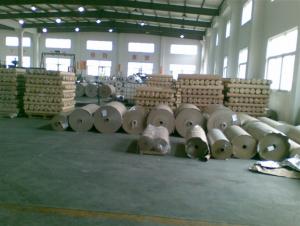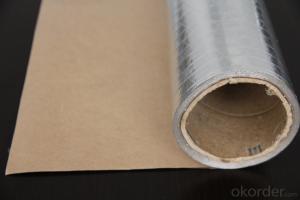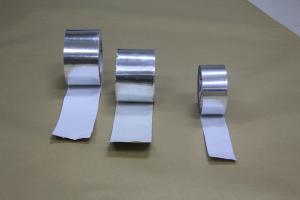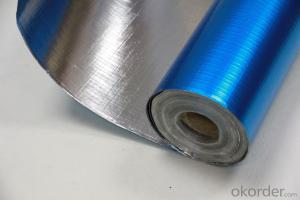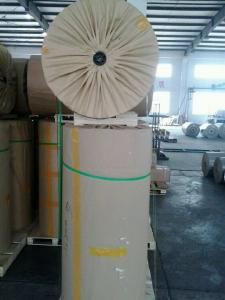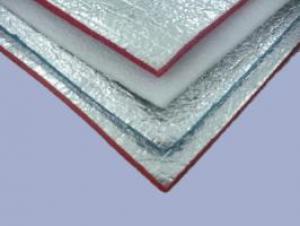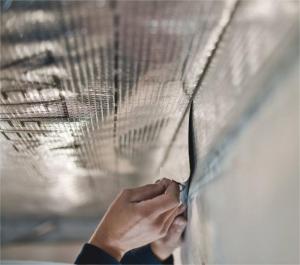Insulation Facing material with Bubble and Aluminum Foil
- Loading Port:
- Shanghai
- Payment Terms:
- TT OR LC
- Min Order Qty:
- 1000 m²
- Supply Capability:
- 200000 m²/month
OKorder Service Pledge
OKorder Financial Service
You Might Also Like
Insulation Facing material with Bubble and Aluminum Foil
Product Introduction:
The product consists of two layers of aluminum foil with plastic bubble laminated between the aluminum foil, provides excellent insulation: Reflects up to 97% of radiant energy in addition to resisting other types of heat transfer from conduction, convection and radiation. The two side aluminum foil forms an effective barrier against moisture, air currents and vapors.
It is an economical solution for a wide range of industrial, manufacturing and consumer applications.
Specification:
Name | Single Air Bubble with Aluminum Foil Facing |
Appearance | Silver/Customized |
Structure | Aluminum Foil/woven/bubble/woven/alu foil |
Width(cm) | 100 ~ 150 |
Length (m) | 50~200 |
Unit Weight | 500g/m2 |
Thickness | 3.5mm |
Bubble Diameter | 7mm,10mm,12mm,20mm,25mm,30mm,35mm |
Bubble Height | 2.5mm/3.8mm/4mm/5mm |
Water Vapor Transmission | 0.012g/m2KPA |
Thermal Conductivity | 0.034W/M0 |
Emissivity | 0.03~0.04COEF |
Reflectivity | 96%~97% |
Tensile Strength (MD) | 165N/25mm |
Tensile Strength(CMB) | 140N/25mm |
Bursting Strength | 385N |
Treatment | FR/VCI/Perforated available |
Temperature Resistance | 4 hours no decladding -60℃/180℃ |
Structure:
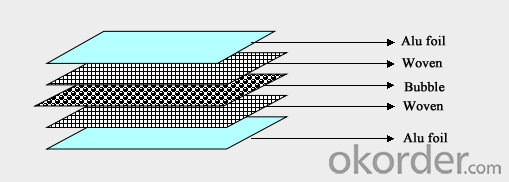
Other Products:
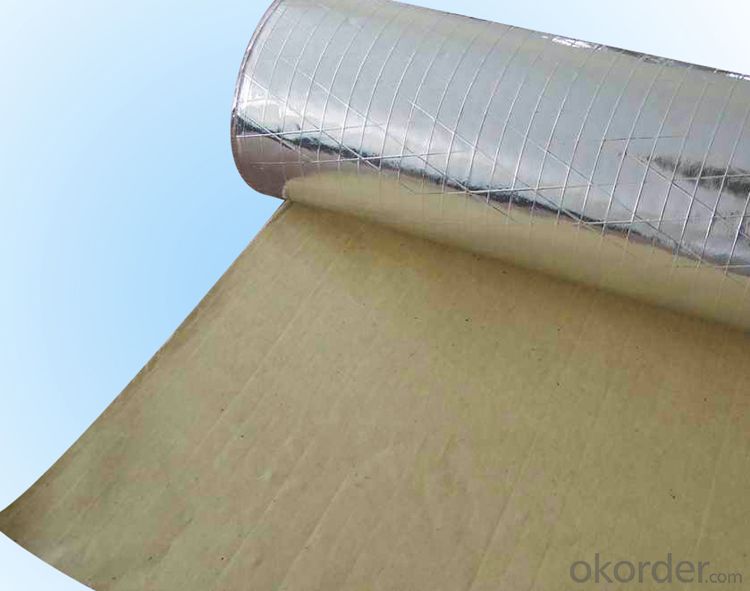
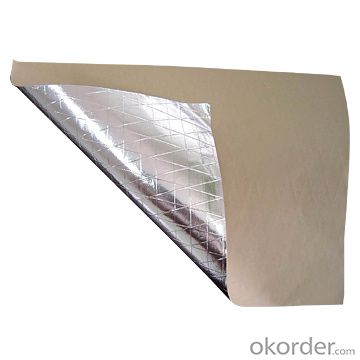
FAQ:
1. Where is your factory located in?
Factory is located in Jiangsu Province, Neat to Shanghai Port.
2. How long have you been in this product production?
We have been in the business more than 10 years,
3. Can we have some sample or trial order before bunk order?
Yes, we can provide you some free samples, and for trial order, we will offer you the lowest price.
- Q: This question is asking for instructions on how to clean and store aluminum foil rolling film to maintain its quality and usability.
- <p>To clean aluminum foil rolling film, gently wipe it with a damp cloth to remove any residue. Avoid using abrasive materials that could scratch the surface. After cleaning, let it dry completely. To store, roll the film tightly and wrap it in a protective layer, such as a plastic wrap or a clean cloth, to prevent dust and scratches. Store it in a cool, dry place away from direct sunlight to maintain its integrity.</p>
- Q: What are some effective ways to utilize aluminum foil in the kitchen?
- <p>Using aluminum foil effectively in the kitchen can enhance cooking and food preparation. Here are a few tips: 1) Line baking sheets to prevent food from sticking and make cleanup easier. 2) Create a tent over food when roasting to retain moisture and prevent over-browning. 3) Use foil to wrap individual portions for steaming or baking, which can be helpful for portion control. 4) Create a foil packet for cooking fish or vegetables on the grill or in the oven, which helps to steam and retain flavors. 5) Use foil to shape and mold food, such as a bowl for a souffl茅 or a mold for jello. 6) Double or triple layer the foil for durability when wrapping meats or creating containers. 7) Cut a small piece of foil to cover a small dish or to create a makeshift lid. Always handle with care when removing hot foil from the oven, as it can be very hot.</p>
- Q: Is it safe and practical to use aluminum foil facing as a substitute for a kitchen cutting board?
- <p>Using aluminum foil facing as a kitchen cutting board is not recommended. While it may seem like a convenient alternative, it can dull your knives quickly and may not be as sanitary as a proper cutting board. Aluminum foil is also not designed to withstand the pressure and friction of cutting, which could lead to tearing or puncturing the foil, potentially causing injury or contamination. It's best to use a cutting board made from materials like wood, plastic, or bamboo, which are specifically designed for food preparation and cutting.</p>
- Q: Is it safe to use aluminum foil with a reflective side to wrap vegetables or fruits?
- <p>Yes, you can use aluminum foil facing to wrap vegetables or fruits. Aluminum foil is a versatile kitchen tool known for its heat conductivity and non-stick properties. The shiny side of the foil, often referred to as the 'facing', is safe for food contact and does not release harmful substances when used properly. It's commonly used to wrap foods for cooking, preserving freshness, or for storage. However, it's important to ensure that the foil does not tear or come into direct contact with the heat source as it could lead to burning or melting, which is not safe. Always follow the manufacturer's guidelines for safe usage.</p>
- Q: How should one properly clean and store aluminum foil facing after usage to maintain its quality and hygiene?
- <p>The best way to clean your aluminum foil facing after use is to gently wipe it with a damp cloth to remove any residue. Avoid using abrasive materials as they can scratch the surface. After cleaning, let it dry completely. To store, roll it up tightly or fold it neatly, and keep it in a cool, dry place away from direct sunlight to prevent any damage or discoloration. Use a resealable plastic bag or a designated container to protect it from dust and moisture.</p>
- Q: This question asks about the safety of using aluminum foil facing for extended periods.
- <p>Using aluminum foil facing for long periods of time is generally safe, but it depends on the specific application and conditions. Aluminum foil is non-toxic and commonly used in cooking and food storage. However, prolonged exposure to high heat can cause the foil to break down, potentially releasing small amounts of aluminum into food. It's also important to avoid using aluminum foil with acidic foods as this can increase the leaching of aluminum. For best safety, use foil as directed by the manufacturer and replace it when it shows signs of wear or damage.</p>
- Q: Is it possible to use aluminum foil as a cooking surface? If yes, what are the methods of using it?
- <p>Yes, aluminum foil can be used for cooking. It's commonly used for wrapping foods to retain moisture and heat, such as when baking potatoes or fish. You can also create a foil packet (en papillote) by placing food in the center of a large piece of foil, seasoning it, and then folding the foil to seal the edges. This method steams the food, keeping it moist. For grilling, use heavy-duty foil to prevent tearing and place food directly on it. Remember, avoid using aluminum foil with acidic foods as it can react and leach aluminum into the food.</p>
- Q: This question asks about the distinction between aluminum foil made from new raw materials and that made from recycled materials.
- <p>Yes, there is a difference between 'virgin' and 'recycled' aluminum foil. Virgin aluminum foil is produced from newly mined bauxite ore and is considered to be of higher purity. It is often preferred for applications requiring high quality and consistency. Recycled aluminum foil, on the other hand, is made from aluminum waste that has been collected, sorted, and reprocessed. It is more environmentally friendly as it reduces waste and energy consumption. However, recycled aluminum foil may have slight variations in thickness and quality due to the recycling process.</p>
- Q: Is it possible to use aluminum foil facing in the creation of desserts?
- <p>Yes, aluminum foil facing can be used for making desserts, particularly for baking purposes. It is often used to line baking sheets or molds to prevent desserts from sticking, making them easier to remove after baking. It also helps in maintaining the shape and presentation of the dessert. However, it's important to ensure that the foil does not come into direct contact with the dessert if it's not oven-safe, as this could lead to contamination or uneven cooking. Always follow the manufacturer's guidelines for the specific type of aluminum foil you are using.</p>
- Q: Is it possible to use aluminum foil with a shiny side facing up as a liner for a baking pan?
- <p>Yes, you can use aluminum foil facing as a baking pan liner. The shiny side of the aluminum foil is non-stick and can be used to line baking pans, making it easier to remove baked goods without sticking. Ensure the foil is heavy-duty to withstand high temperatures and prevent tearing. However, avoid using it for direct contact with acidic or alkaline foods, as the foil may react with them. Always follow the manufacturer's guidelines for safe use.</p>
Send your message to us
Insulation Facing material with Bubble and Aluminum Foil
- Loading Port:
- Shanghai
- Payment Terms:
- TT OR LC
- Min Order Qty:
- 1000 m²
- Supply Capability:
- 200000 m²/month
OKorder Service Pledge
OKorder Financial Service
Similar products
Hot products
Hot Searches
Related keywords
